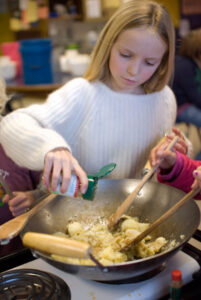Kids Learn to Eat Healthy for a Lifetime

On Lopez Island, off the coast of Washington State, the Lopez Island Farm Education (L.I.F.E.) Garden Program is reaping dramatic results: students, once used to a regular diet of processed fast food, are getting excited about eating delicious, organic school lunches. Students in grades K-12 cultivate their own garden beds and dish up the harvest of organic tomatoes, carrots, potatoes, kale, turnips, beets and broccoli in the lunch line. The program has the potential to affect public policy and become a model for schools nationwide.
L.I.F.E. is built on these principles:
- All children deserve safe, nutritious, delicious food
- Well-nourished children are better able to learn
- Positive childhood eating habits affect lifetime health
- Healthy children are the foundation of a healthy society
Part of the district’s response to a state-mandated wellness policy, L.I.F.E. is an integrated, highly-valued part of the public school curriculum. Critical to the program’s success is the involvement of all members of the school community, from the superintendent and teachers to the kitchen staff and groundskeepers. Today, the program is a source of pride and helps define the school culture.
Elementary School
The K-5 garden teacher gives weekly lessons on everything from literacy and social studies to math and science with a garden-based curriculum. Students, tending their garden beds regularly, often bring the harvest inside to prepare a nutritious snack on their classroom cooking cart.
Middle School
Students in the middle school Farm-to-School class head outdoors twice each week January through June to grow food for the cafeteria. With the addition of three unheated greenhouses in 2009, students’ prolific production of organic tomatoes, broccoli, beets, squash, romaine, leaf lettuces, arugula, Asian greens and bok choy have become a daily part of the lunch menu.
High School
High school culinary classes, held in the school kitchen, are popular skill and confidence builders: students prep vegetables from the garden, help assemble and cook main dishes, bake bread and clean up after lunch. Other high schoolers choose the Farm, Food & Sustainability class at nearby S&S Homestead Farm, a 50-acre biodynamic farm where the curriculum varies by season. Springtime in the fields means soil preparation, seed selection, planting and transplanting. Taking food “from seed to plate,” allows students to experience the entire cycle. They participate in animal husbandry too: birthing, feeding and caring for dairy and beef cows, sheep, pigs and chickens. Rotational grazing, feed production and farm maintenance are also features in the curriculum. Throughout the year students bake bread, make butter, cheese and yogurt, and learn fermentation, preparation and preservation skills in the farm kitchen.
Programs
The L.I.F.E. Garden Program teaches K-12 students how to grow and eat organic, healthy food…
Evening Meals at School serve up organic, affordable communal dinners for the whole community…
S&S Homestead Farm demonstrates principles of sustainability and takes a leadership role in educating youth…
The Vita Parcours Lopez Island Fitness and Ecology Trail offers a scenic fitness experience for all abilities and ages…
Local initiatives support cultural diversity, a connected community, and healthy, well-informed individuals…
Collaborating with a local effort to bring clean water to a village in Ethiopia with the Water for Anasi project…
